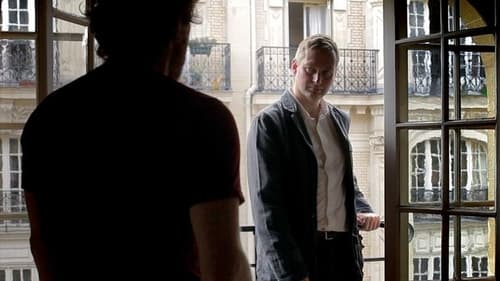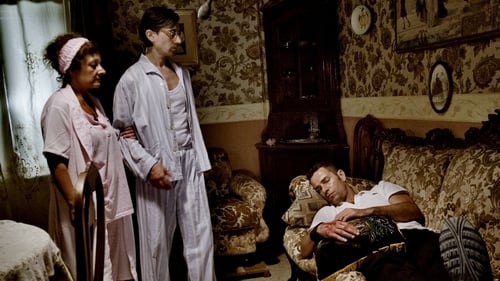
"The word 'revolution' to us Frenchmen is not a vague term. We know that Revolution is a rupture, that Revolution is an Absolute. There is no such thing as a moderate revolution, there is no such thing as a planned revolution—as one speaks of a planned economy. The revolution we are announcing will overturn the entire existing order or it will not take place at all..."

Editor
"The word 'revolution' to us Frenchmen is not a vague term. We know that Revolution is a rupture, that Revolution is an Absolute. There is no such thing as a moderate revolution, there is no such thing as a planned revolution—as one speaks of a planned economy. The revolution we are announcing will overturn the entire existing order or it will not take place at all..."

Director
Today, in France. A man escaped from a detention center travels the roads trying to reach Paris. At the same time, in 1894, a strange scene takes place in an apartment.

Editor
The media hype didn’t do any good for the Calais Jungle. Far from such echoes, Christophe Clavert’s concern is to come back to the sites – afterwards, otherwise. Beginning with clarifications as to how to do things. Thus, by way of a preamble, the scrupulous and detailed reminder of events and the political, administrative context of the jungle in Calais in 2016 while the places the film-maker evokes unfold through slow, methodical sequences. It’s about the tale’s rendition, from one time to another, and from the images of the regime unfolding, with its magnificent drawings taken back then, in counterpoint to the photographic archives and video. A work of hospitality, devoid of excessive light or spectacle, yet insisting on History’s memory, as the final annotation reminds us with striking dryness.

Cinematography
The media hype didn’t do any good for the Calais Jungle. Far from such echoes, Christophe Clavert’s concern is to come back to the sites – afterwards, otherwise. Beginning with clarifications as to how to do things. Thus, by way of a preamble, the scrupulous and detailed reminder of events and the political, administrative context of the jungle in Calais in 2016 while the places the film-maker evokes unfold through slow, methodical sequences. It’s about the tale’s rendition, from one time to another, and from the images of the regime unfolding, with its magnificent drawings taken back then, in counterpoint to the photographic archives and video. A work of hospitality, devoid of excessive light or spectacle, yet insisting on History’s memory, as the final annotation reminds us with striking dryness.

Screenplay
The media hype didn’t do any good for the Calais Jungle. Far from such echoes, Christophe Clavert’s concern is to come back to the sites – afterwards, otherwise. Beginning with clarifications as to how to do things. Thus, by way of a preamble, the scrupulous and detailed reminder of events and the political, administrative context of the jungle in Calais in 2016 while the places the film-maker evokes unfold through slow, methodical sequences. It’s about the tale’s rendition, from one time to another, and from the images of the regime unfolding, with its magnificent drawings taken back then, in counterpoint to the photographic archives and video. A work of hospitality, devoid of excessive light or spectacle, yet insisting on History’s memory, as the final annotation reminds us with striking dryness.

Director
The media hype didn’t do any good for the Calais Jungle. Far from such echoes, Christophe Clavert’s concern is to come back to the sites – afterwards, otherwise. Beginning with clarifications as to how to do things. Thus, by way of a preamble, the scrupulous and detailed reminder of events and the political, administrative context of the jungle in Calais in 2016 while the places the film-maker evokes unfold through slow, methodical sequences. It’s about the tale’s rendition, from one time to another, and from the images of the regime unfolding, with its magnificent drawings taken back then, in counterpoint to the photographic archives and video. A work of hospitality, devoid of excessive light or spectacle, yet insisting on History’s memory, as the final annotation reminds us with striking dryness.

Cinematography
A film in three parts: An aquarium, a man sitting at a table reading various text passages, and a sequence from Jean Renoir’s film LA MARSEILLAISE. This is all from a film by Jean-Marie Straub – about fate, the soul and the cosmos, about the evident nature in which man lives, just like in the aquarium surrounding him. And finally, there’s the nation as a symbol for the community of free people. A Straub film represents a gift that isn’t based on exchange, but rather the opposite of communication. And what could be more beautiful and liberating in life?

Editor
A film in three parts: An aquarium, a man sitting at a table reading various text passages, and a sequence from Jean Renoir’s film LA MARSEILLAISE. This is all from a film by Jean-Marie Straub – about fate, the soul and the cosmos, about the evident nature in which man lives, just like in the aquarium surrounding him. And finally, there’s the nation as a symbol for the community of free people. A Straub film represents a gift that isn’t based on exchange, but rather the opposite of communication. And what could be more beautiful and liberating in life?

Editor
In a single static shot a man is threatened with death at another's gunpoint.

Director of Photography
In a single static shot a man is threatened with death at another's gunpoint.

In a single static shot a man is threatened with death at another's gunpoint.

Editor
Jean-Marie Straub pushes this musicality of blocks to a paroxysmal extreme, mixing blocks of time (40 years separate the various extracts that are going to be used, and what is to be filmed), blocks of text (Malraux, Fortini, Vittorini, Hölderlin) and blocks of language (French, Italian, German), and from this ruckus emerges the history of the world, yes, History with a capital H, and from the same movement, the political hope of its being overtaken. So this is an adventure film, about the Human adventure, still one that is always, in the end, overtaken by Nature. (Arnaud Dommerc)

Director of Photography
Jean-Marie Straub pushes this musicality of blocks to a paroxysmal extreme, mixing blocks of time (40 years separate the various extracts that are going to be used, and what is to be filmed), blocks of text (Malraux, Fortini, Vittorini, Hölderlin) and blocks of language (French, Italian, German), and from this ruckus emerges the history of the world, yes, History with a capital H, and from the same movement, the political hope of its being overtaken. So this is an adventure film, about the Human adventure, still one that is always, in the end, overtaken by Nature. (Arnaud Dommerc)

Director of Photography
Master filmmaker Jean-Marie Straub continues his exploration of classic texts with this "collaboration" with the great 16th-century writer of the Essais.

Cinematography

Production Coordinator
Salvo, un despiadado sicario de la mafia siciliana, cambia sus prioridades después de verse involucrado en una sangrienta emboscada.

Director

Cinematography
A Kafka dialogue is read by actors in Straub's own apartment in Paris.













